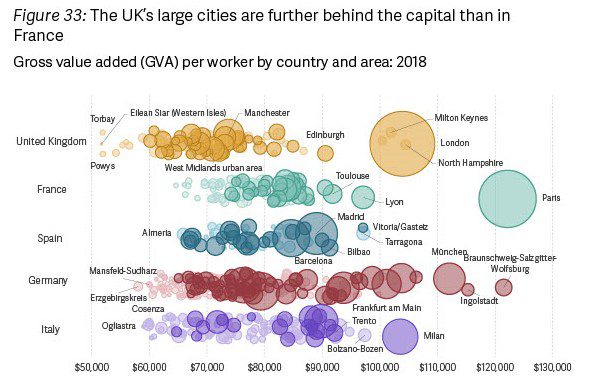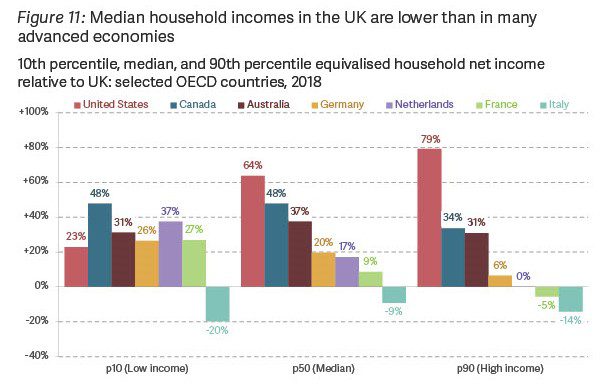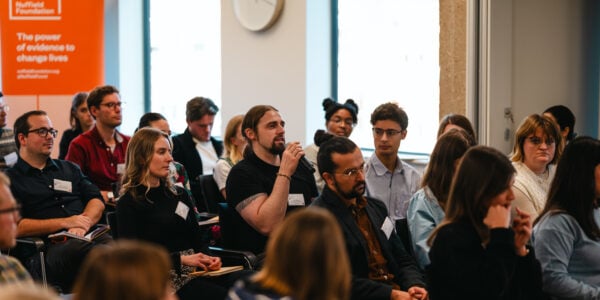The final report of The economy 2030 inquiry offers a long-term economic strategy based on inclusive growth
In December 2023, the Resolution Foundation and the Centre for Economic Performance (CEP) at the London School of Economics released the final report of The economy 2030 inquiry – Ending stagnation: a new economic strategy for Britain.
The report delivered a clear and coherent vision for a long-term economic strategy, with people and places at its heart. Ending stagnation is the product of nearly three years of dedicated research, analysis and strategic policy formation.
Conclusions from Ending stagnation
1. The UK economy has experienced a long period of stagnation
The UK has weathered a decade and a half of economic stagnation, marked by:
- low growth and high income inequality
- labour market precarity
- high housing costs
- geographical disparities
- insufficient public and private investment
The economy has also shifted away from trade openness, compounding the productivity challenge.

2. A path to prosperity and equality
Ending stagnation is not just a diagnosis, it charts a course toward a more prosperous and equitable Britain. The report shows how to:
- leverage the nation’s strengths as a services exporter
- increase and sustain public investment
- catalyse long-term private investment
- improve job quality through better standards and regulation
It sets out the changes required for better taxes and a social security system that doesn’t let people fall even further behind. The report also provides the keys that could unlock the huge potential of Britain’s second cities.

3. Navigating trade-offs
Inevitably there are competing objectives in any strategy. The trade-offs in this strategy include:
- More investment means lower household consumption or increases in borrowing
- Workforce expansion in major cities increases pressure on local housing markets
- Higher wages will feed through to the costs of some goods and services
The report provides a framework for making balanced judgements and managing the risks, particularly to those on low and middle incomes.
Reflections from the report launch: challenges and opportunities
Discussions at the launch spotlighted further challenges, including the need for new trade strategies, sluggish planning systems, inadequate transport infrastructure, centralised decision-making hindering local growth, and short-term decision-making. Many of which are addressed in the detail of the report.
A common thread was the urgent need for investment in people, public services, and private sector innovation.
Some questioned the feasibility of delivering change at the scale proposed, but there was general agreement that the size of the prize could be huge: shared prosperity for the UK.
The Inquiry calculates that if the UK matches the average income and inequality levels of comparable economies like Canada, France, or the Netherlands, the typical household could be £8,300 better off per year, with a 37% income gain for the poorest households.

The report provides the route map for change. It includes many worthwhile policy proposals. Success, however, will not be achieved unless they are part of a holistic, long-term strategy that addresses both growth and inequality.
Concluding the inquiry: a blueprint for the future
As the first large-scale strategic grant to reach its conclusion, the economy 2030 inquiry aligns with the goals of our 2017 strategy to tackle significant policy challenges amid rapid change and uncertainty.
It has been delivered by a ground-breaking collaboration between the Resolution Foundation and the Centre for Economic Performance (CEP), and engaged stakeholders across the political spectrum at the national and local level, alongside the third sector and the public. The final report serves as a practical guide for the next government to enhance living standards in the UK.
I would like to extend huge thanks to Torsten Bell and Steve Machin, the teams at the Resolution Foundation and the CEP who have worked so incredibly hard and made the Inquiry’s work possible.
I would also like to thank those who have provided specific research and expertise along the way, the Commission, the advisory group, and the many individuals who engaged in a personal capacity – sharing their lives, hopes and fears for the economy – with the Inquiry.
Upcoming Webinar: Place and Opportunity
Interested in the future of the nation’s skills and labour market? Join our webinar in January to hear key insights from the Resolution Foundation, the Institute for the Future of Work and the National Foundation for Education as they take us through the findings from their Nuffield Foundation-funded projects. Register now:































